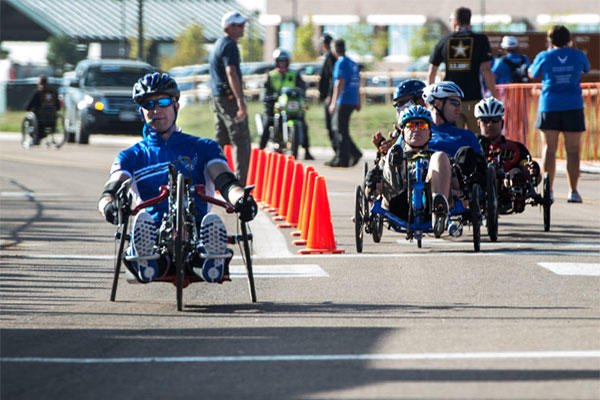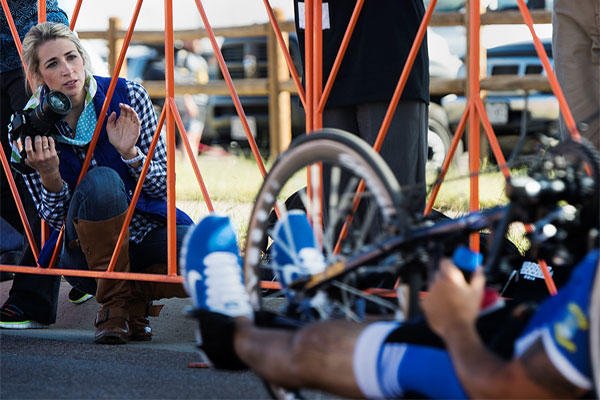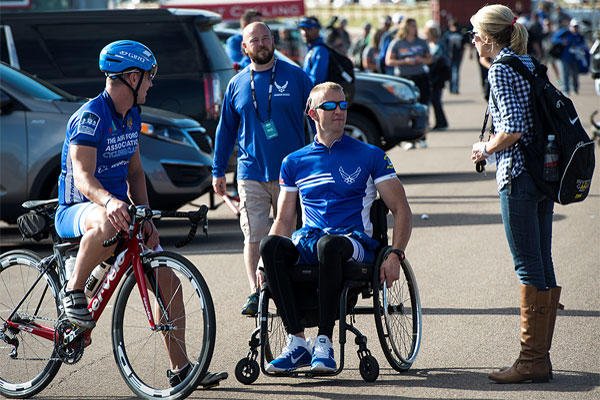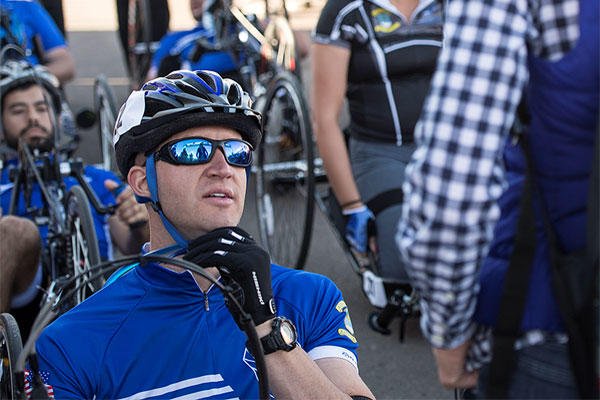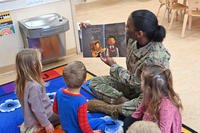COLORADO SPRINGS, Colo. -- When a couple talks about how they first met, a phrase commonly heard is, "Well, they just fell into my life." For one couple, the expression could be taken quite literally. When Jeremiah Means first met Ashley, she was tripping in front of him as she tried to rush through a doorway. He called out to her to make sure she was OK and their relationship began.
Now, after eight years of marriage, it is Ashley who is there to catch Jeremiah when he falls. She not only holds the role of wife and companion, but also that of a caretaker to her husband, an Air Force wounded warrior.
It is with Ashley's dedicated support that Jeremiah is competing in the air-rifle and hand-cycling events during the 2014 Warrior Games here, Sept. 28 to Oct. 4, 2014.
The couple's lives were first turned upside-down in 2009. Jeremiah was a senior airman in the Air Force Reserve working to become a survival, evasion, resistance and escape specialist; however, his plans were derailed after receiving a routine medical shot. He had a rare reaction that resulted in Susac's Syndrome. The disease attacked his brain and caused personality changes, a loss of mobility, vision impairment and deafness. Because Susac's Syndrome is such an uncommon disease, for close to a year Jeremiah went misdiagnosed.
Jeremiah's initial symptoms manifested themselves as terrible headaches and behavioral outbursts. Ashley said she remembered a day when Jeremiah returned home after working a night shift and began acting strange. She had put their infant son to bed and was relaxing in the living room. Jeremiah was in the bedroom trying to catch up on sleep, but he kept waking up.
"He was going through this weird cycle," Ashley said. "He'd come out and start yelling and cussing and screaming at me to be quiet. I was reading or something. I wasn't doing anything, and he'd go back [to sleep] and it'd be completely quiet."
After Jeremiah returned to the bedroom, his confused and worried wife went to check on him and watched as he would go from being sound asleep to waking up, crying and holding his head as he rocked back and forth, all the while complaining about noise.
As his condition worsened that night, they decided to seek medical attention. By the time they reached the local hospital, Jeremiah no longer recognized Ashley and was combative, irritated and ultra-sensitive to light and sound. Due to the severity of his reaction, Jeremiah was transferred to a hospital in Birmingham, Alabama, where he stayed for more than two months.
Ashley said Jeremiah changed during his stay. His fine motor skills became impaired, and he forgot how to walk. Memories of names and dates would also get jumbled in his head. Due to the still-present disease, the man who checked out of that hospital varied from the one who had originally checked in.
"Coming home from the hospital, it was like being married to a stranger," Ashley said. "He wasn't anywhere close to the fun, outgoing, strong guy he had been. I'm not saying he was weak, but mentally, he went back to about a 12-year-old mindset about things, because it attacked his brain. It was like living with a strange teenager."
With both a baby at home and a husband who needed additional care, Ashely's position in the family radically altered. The hardest thing about being a caregiver, Ashley said, was trying to figure out how to balance the family role she'd held before Jeremiah got sick with the one she has now. The main role she had to adapt was between herself and Jeremiah -- how to still be a wife and then provide extra support without being overbearing.
"Just that change in somebody who was strong and never needed help, to somebody who is still strong but needs help and doesn't want to ask for it; and walking that line of not trying to baby or be a nurse, but to assist -- assisting in a way that doesn't make him feel like I have to help him because he can't [take care of himself]."
Jeremiah admitted that for the first three years of his illness, he was a hard person to be around. He said Ashley had every opportunity to leave, and if she had taken that route, he wouldn't have felt like she was doing anything wrong.
"I was only worried about me and honestly that's not the way it should have been," Jeremiah said. "I couldn't hear, so I'd yell when I talked, because if I can't hear, how do I know you're hearing me? I just wasn't the old Jeremiah that I wanted to be and I just didn't know how to go back to that individual."
Part of the couple's healing process began though Jeremiah's participation in the Air Force Wounded Warrior Program's adaptive sports events, such as sport camps, the Air Force Trials and now, the Warrior Games. Not only was Jeremiah welcomed as part of a new Air Force team, but at the same time Ashley was also able to connect with others going through the same adversity she had experienced.
"I didn't have any military support group," Ashley said. "So this, coming here was the first time I felt like I was recognized as a caregiver. I think it would have helped make life a bit easier, knowing other wives who've gone through and are dealing with major changes to their family and husband -- just knowing there are other people out there, because you feel really isolated, or at least I did."
She added that it has been encouraging to be surrounded by other wounded warrior spouses who are staying committed and weathering the storm, no matter how difficult their situations.
"I've had a lot of people say, 'Well, you're just extraordinary that you stayed with him,' " Ashley said. "Well, isn't that what I committed to -- for better or for worse? I'm going to stay with him no matter what. No, I'm not doing anything extraordinary. I'm doing what I committed to and sticking to it."
As Ashley benefited from the new support, so did Jeremiah. During the past year, Jeremiah said it felt like something clicked in him, showing him how he needed to be living his life and supporting his family. Through this epiphany, Ashley said she's seen her husband start to mentally transform back into the man he was before.
"He doesn't deal with stress well, but stuff like that I can deal with," Ashley said. "He loves our son, and he tries really hard to be a good dad. He wants to be involved. He's a lot kinder most of the time, unless he gets upset, but then I think we all have those days. It's a lot better now because he's a lot more like himself."
Jeremiah feels he wouldn't be here right now if Ashley wasn't there to support him. In fact, he said she was the one who told him to compete in the first place.
"I told her, 'Honey, you know if I end up doing this I'm not going to give it 100 percent, I'm going to give it 110 percent, which means I might get on a team, which means there might be bigger and better things down the road,'" Jeremiah said. "She said, 'I know, that's why I want you to do it.' "
Today, five years after their ordeal, Ashley and Jeremiah have a new normal, one they feel they can build on for the future. For Ashley, who stumbled through the doorway so many years ago, she is now the one who steadies her family when they falter. She now calls out to make sure they are OK.
